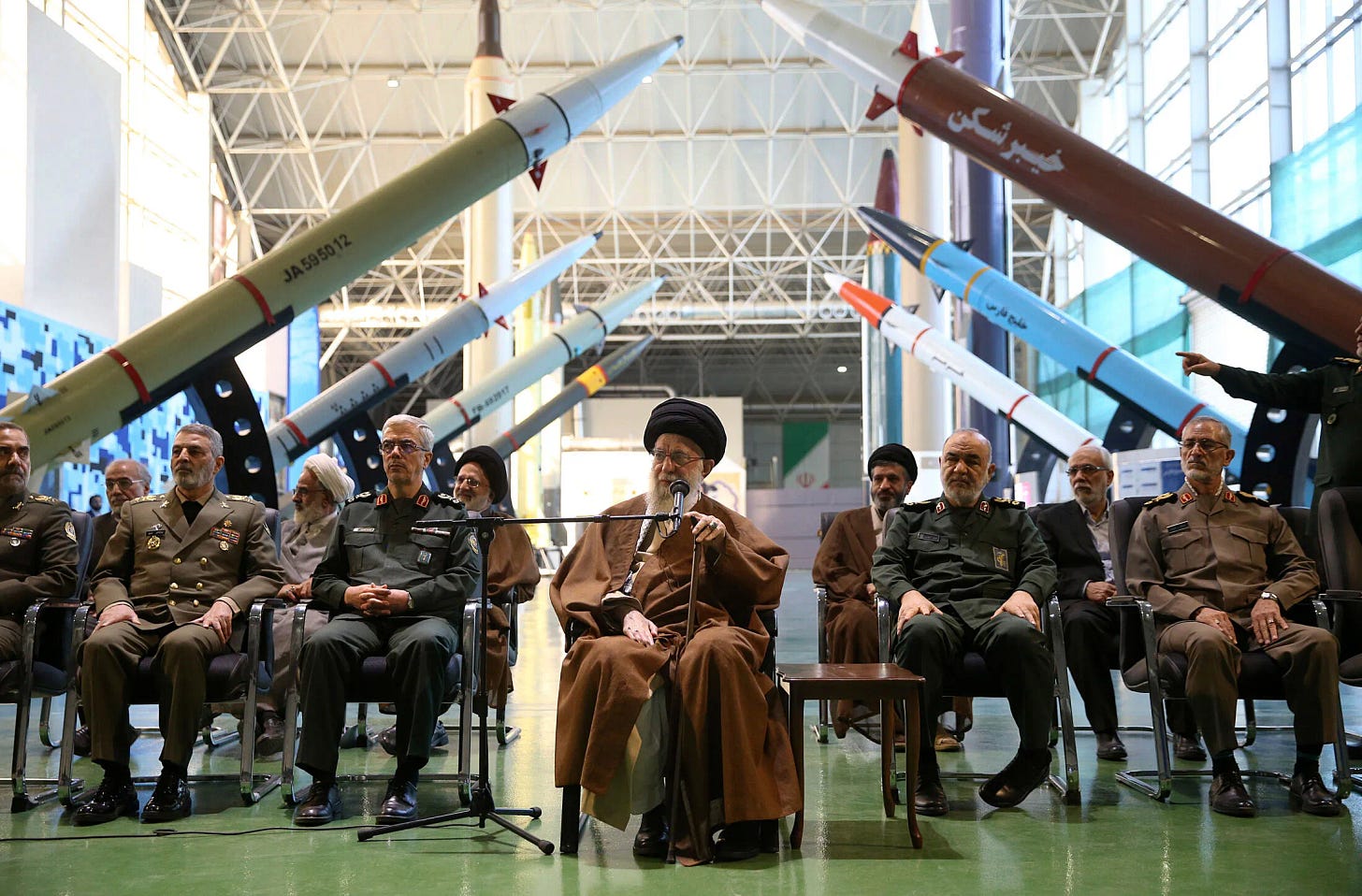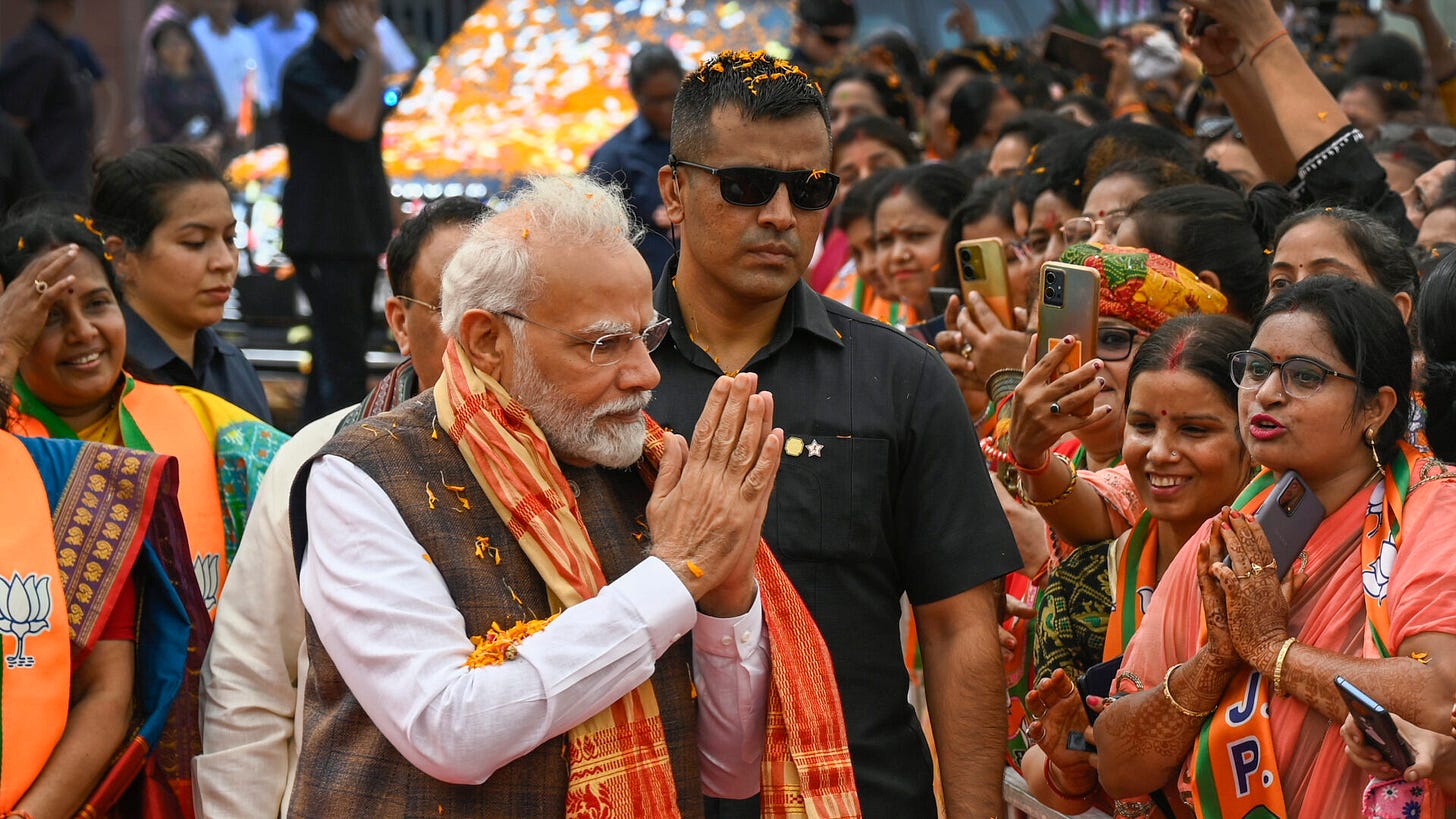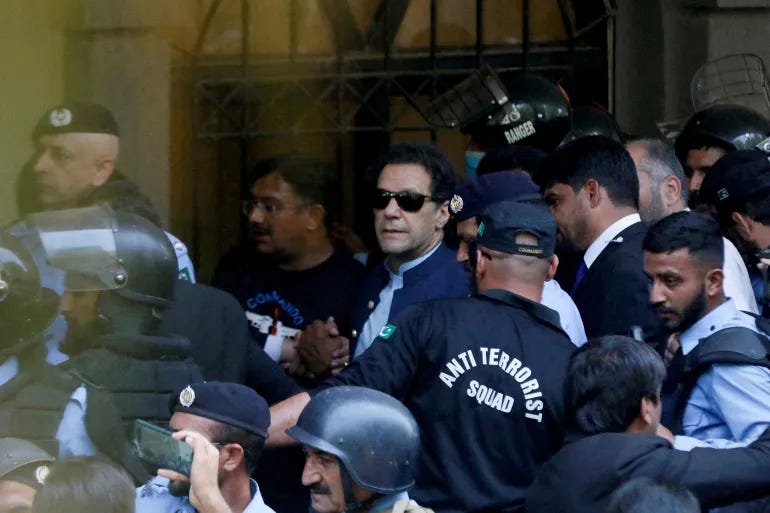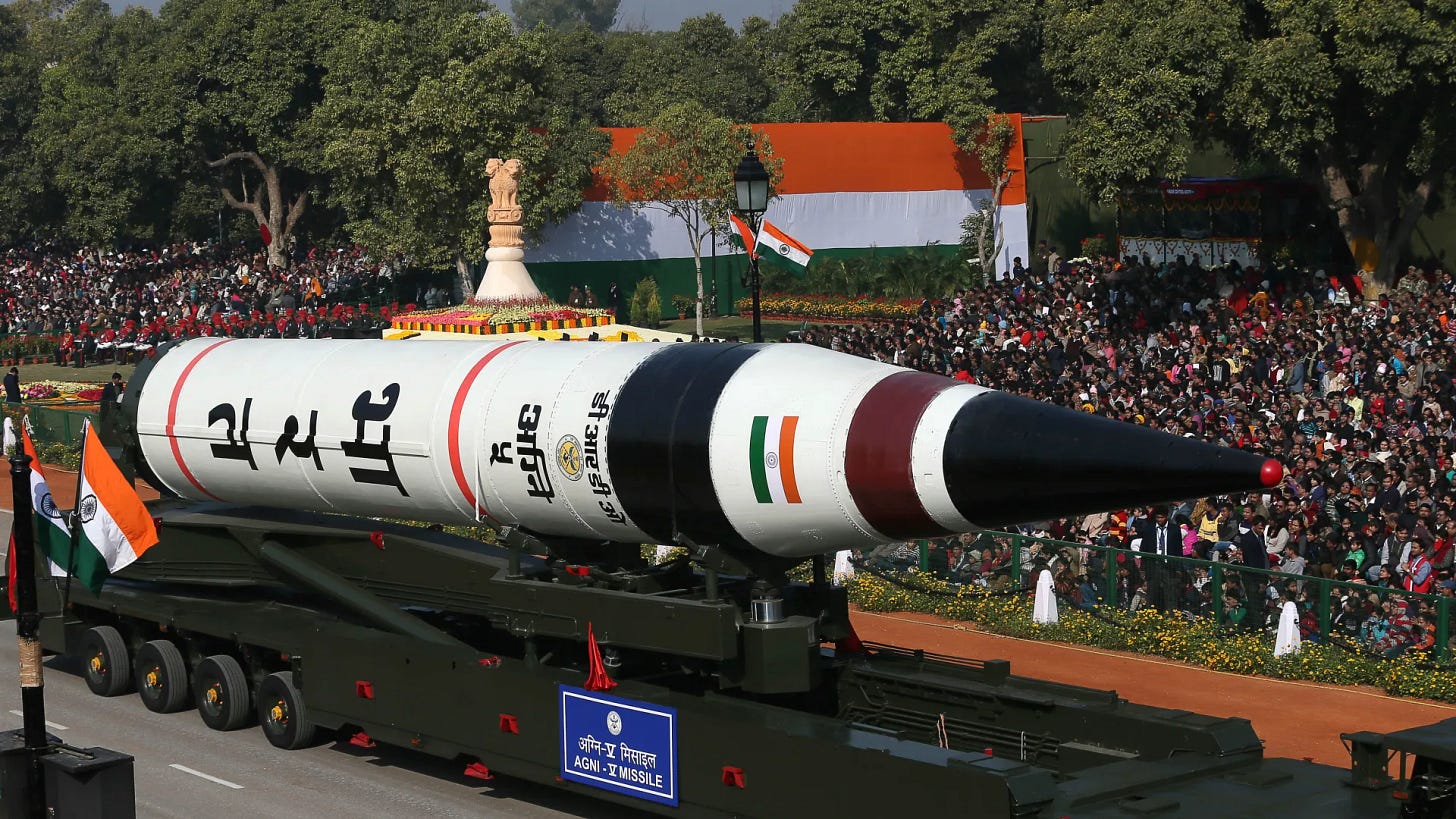good evening reader,
India and Pakistan exchange rocket fire, Labor wins the federal election, and I’ve started a new job.
First today’s top story,
Getting Hot
On Wednesday, in the early hours of the morning India did as they said they would and attacked Pakistan.
Since then both sides have been firing artillery at one another, and shooting down each others planes. As of today (the 10th) they are now exchanging rockets too.
India said they would respond to last months terrorist attack in Kashmir by attacking Pakistan, and Pakistan said that to any attack they would respond in kind. They’ve both held true to their word, and things keep ramping up.
They’re climbing the so called ‘escalation ladder’ together, as both sides continue to respond to force with increased force. This isn’t yet a ‘war’, but it soon could be.
I know you are but what am I!
We saw a similar case of classic escalation politics between Israel and Iran last year, it went like this.
Israel invades Iranian-backed Hezbollah in southern Lebanon, so Iran responds by firing rockets at Israel. Israel responds to the Iranian rockets with rockets of their own, so Iran responds with even bigger rockets and so on and so on. This case did not end in all out war between the two nations because Iran couldn’t keep going up the ladder. The case of India and Pakistan however may not end as easily.
Israel in this case holds what we in the intelligence community call ‘escalation dominance’ over Iran. Escalation dominance means that one side has the ability to escalate a conflict to a level that the other side can’t reach. Israel has nuclear weapons and a modern military equipped by the mighty USA, who have been begging for a reason to topple Iran for years. Iran can’t keep climbing the escalation ladder, because they know that at the top rung lie Israeli nuclear missiles or an American invasion.
Israel has strong deterrence, because they have access to force that their enemies don’t. India and Pakistan however don’t face this same barrier to war.
India and Pakistan both have nuclear weapons, they both have modern enough missiles and drones, fighter jets and tanks, and millions and millions of potential soldiers who already hate their enemy with a burning passion.
The conflict between Israel and Iran died down because Iran was forced to choose between backing down or national suicide. Neither India nor Pakistan are faced with the same dilemma, and so the only way things will cool off is if one side throws in the towel. I don’t think this is likely.
India
India is ruled by ‘strongman’ Narendra Modi who has been prime minister for 11 years, overseeing a rise in ‘Hindu Nationalism’, and an increasingly critical position towards Islam, India’s second largest religion. Indian politics are complex and different to what we would understand in the West, but approximately he’s been moving India more towards the authoritarian right.
His language towards Pakistan and Islam more broadly has always been rather brash, and his governments recent comments don’t leave them much wiggle room.
They seem to want conflict, and popular sentiment in India might want it too. It’s hard to see them backing down. As of 5 minutes ago (2:25, May 10th) the Indian military has said Pakistani drone strikes across India’s western border represent a “blatant escalation”, and that “India will thwart enemy designs”.
India is also in a better position to win a war than Pakistan. They’re obviously the larger and richer country, have a more modern military, and have the nominal backing of the US, who have sold India most of their arsenal. Their other historic enemy in China seems unlikely to intervene against them.
India likely sees a war with Pakistan as very winnable.
Pakistan
Pakistan on the other hand is far more complicated. Their former prime minister and test cricket captain Imran Khan’s political party (which he currently leads from jail where he’s serving a 14 year sentence on charges of corruption), is in a deadlock with the ruling Pakistani Muslim Party. Both sides have withdrawn from negotiations, and the parliament has been stuck in a deadlock since their election in 2024. Meanwhile the military has all but taken control of the country, and they will likely be making all the important decisions in the coming months.
The civilian leaders who in a different time may tamper down the war hawks in the army are weak in Pakistan today.
India’s first strike on Pakistan earlier this week destroyed a mosque, and hit many other sites inside Pakistan proper, killing civilians in the process. As is the case in India, Pakistan views their actions as rightful retribution for the attacks of the other.
While their military is nominally inferior to India’s, if any lesson has been learnt in the past 3 years it’s that smaller nations cannot be so easily rolled over by larger ones, as the conflict between Russia and Ukraine has laid bare, and Pakistan is still huge.
They have a population of 250 million, and a massive military arsenal. They’ve been the strategic ally of China in a classic case of enemy-of-my-enemy-is-my-friend diplomacy, who have sold them lots of military gear.
While I don’t see it as being likely that China will want to be involved, especially if the US comes to the aid of India (I don’t think this is likely either), Pakistan will hope to be able to rely on a steady supply of Chinese arms to keep them fighting for a long war, if need be (although I wouldn’t expect either the US or China to offer much support to either side, and risk nuclear war).
Pakistan have no significant disadvantage against India that would make war the unthinkable strategic blunder that it would have to be for them to bite the bullet and back down.
Nuclear
The big threat is of nuclear war. This has historically been seen as unlikely.
Because of the proximity of the two nations, any nuclear exchange risks harming the one who fired it. A change of wind can blow radioactive dust anywhere in the region.
Both countries would also know that firing a nuke would likely be met with the same, and that the watchful US and China would not tolerate nuclear war in South Asia.
One way this conflict could go nuclear, if I’m to wildly speculate, is if one side is put on so-called ‘death ground’. If Pakistan is losing the war for instance, and the military leaders think that defeat will mean not only their own execution, but the occupation and dismemberment of their state, they may feel as though there is no reason not to press their red button.
The classic example is of WW2 Germany, where Hitler and co had already gone so all-in on genocidal war that surrender would mean the same thing, for them, as total defeat. It’s considered important nowadays for countries in a war to be given a ‘way out’ rather than demanding their unconditional surrender.
However remote, it’s conceivable that a few years down the line, in the worst case scenario, Pakistan and their military rulers may be facing complete defeat and say fuck it.
(This is almost inconceivable, as the total defeat and occupation of such a massive country as Pakistan would be incredibly difficult, and it’s one degree from impossible for Pakistan to do the same to India. If there are however infinite universes, this happens in at least a handful of them)
This is one conceivable scenario for nuclear war. Another is a continuation of the gradual escalation we’ve already seen, simply progressing to its logical conclusion. One side fires a small ‘tactical’ nuclear missile, the other side fires two, and eventually it ends with both sides emptying the clip. This is the classic nuclear war scenario, which ends badly for everybody. No rational actor would ever go down this path, of course, but the risk is always that the desperation and insanity of war might turn a Jekyll into a Hyde.
The official nuclear policy of India is “no-first use”, meaning they would only use them in response to a Pakistani nuclear strike. Pakistan on the other hand has a policy of “full-spectrum deterrence”, where they make no promises not to use smaller, tactical nuclear weapons first, although these “policies” likely mean very little when the rubber meets the road.
But all this to say, we can only wait and see what happens. There is obviously so much happening behind the scenes as we speak. But I have to say I’m not optimistic.
It would be a great tragedy for the world if India and Pakistan go to war.
Electile Dysfunction
We had an election last weekend, where Labor secured the most seats they’ve ever held. I was surprised by the scale of their victory.
I, like many others, thought we might be in for a Labor-Green coalition, or a minority government, but the opposite occurred.
I might put out something about this next week, but a few thoughts now.
The Greens Turn Brown
I was very surprised with the swing against the Greens. They currently don’t hold a single seat, and may pick up 1 or 2 if they’re lucky. I think this was due in part to people caring less about climate change.
In 2022 vote compass had it as the no.1 listed issue amongst voters, whereas this year it was a distant no.4, with cost of living being by far the most important issue this time around. This is always the case, people care about climate change when they don’t have to worry about their immediate needs.
Given most people are poorer than they were in 2022, this isn’t that surprising, and I guess the usual greens base of post-materialist urbanites were just more inclined to ‘play it safe’ this time around. I also think this election more broadly showed that people wanted stability above all else, and this hurt the Greens.
The Spectre of Trump
He hangs over us all. The uncertainty he’s created globally has hurt conservative parties everywhere, especially across the anglosphere where we saw 2 weeks ago the centre left Canadian Liberal party win the unwinnable election, and now Albanese has done the same here. Both of these incumbents faced almost certain defeat just 2 months ago, but since then Trump’s chaos has rippled out across the world and by association, hurt conservative parties everywhere.
Additionally, our respective governments got the chance to front a press conference and denounce the enemy, America. Countries under attack almost always come together behind their leader. Albo and especially the fella up in Canada certainly benefited from this swelling of patriotism in response to American tariffs.
So thank you Mr President, for your part in the Labor victory.
In other news
…zzzzzzzzzzzzzzzzzzzzzzzzzzzzzzzzzzzzzzzzzzz…
…zzzzzzzzzzzzzzzzzzzzzzzzzzzzzzzzzzzzzzzzzzzzzzz…
…zzzzzzzzzzzzzzzzzzzzzzzzzzzzzzzzzzz…
oh, sorry about that. I just fell asleep at the keyboard looking at the NGV’s winter programming. French Impressionists? guys come on.
We’ve had a few boring ones recently. Bring back the modern stuff, the two best shows the NGV has held in my lifetime were the Warhol/Ai Weiwei and the Haring/Basquiat. Another vibrant painting of a chateau in the springtime and I might throw up.
That’s it for now, until next time











